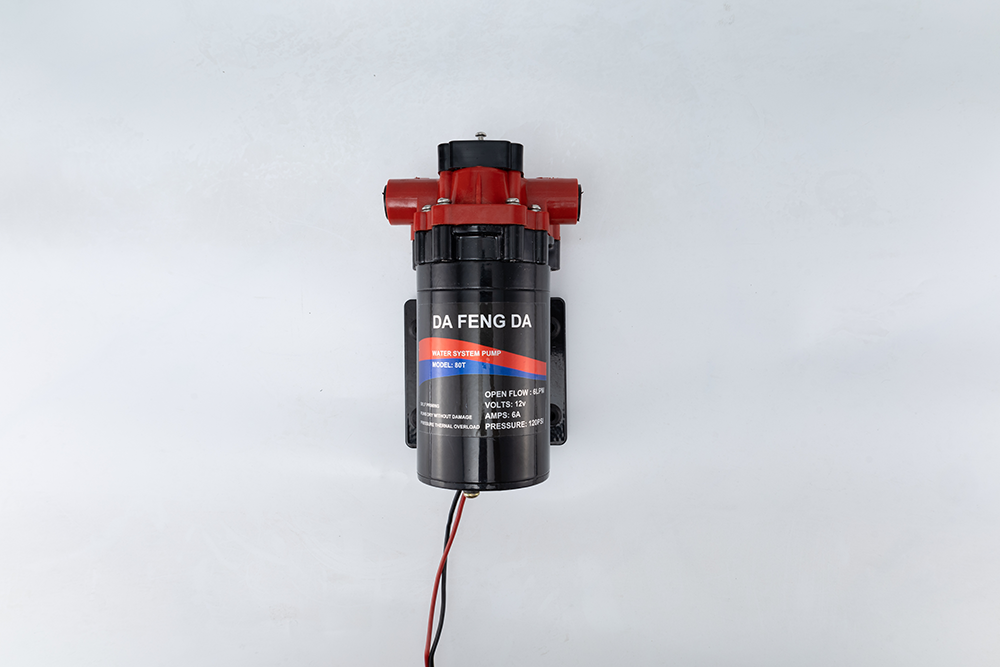Mechanics of High-Pressure Diaphragm Pumps in Agriculture
Core Components & Operational Design
High-pressure diaphragm pumps are essential in agriculture, primarily because they consist of diaphragms, valves, and pressure chambers working collaboratively to move fluids effectively. These components collectively create the pressure required to transfer fluids, which is crucial for tasks such as irrigation and spraying pesticides. The operational design of these pumps is innovative, converting mechanical energy into hydraulic energy efficiently. This enables precise control over fluid flow and pressure, making them indispensable in tasks like irrigation and fertilizer application where precision is critical. Their design ensures that fluid dynamics are precisely managed, resulting in efficient agricultural operations.
Advantages Over Traditional Pump Systems
High-pressure diaphragm pumps offer numerous advantages over traditional pump systems. Firstly, they are exceptionally durable, requiring less maintenance than centrifugal pumps—an attribute that makes them ideal for demanding agricultural environments. They can handle various pressures and flow rates, contributing to their versatility in different farm applications, such as irrigation and pesticide spraying. Furthermore, these pumps are energy-efficient, consuming less power, which can significantly reduce costs in large-scale agricultural operations. By offering superior durability, versatility, and energy savings, diaphragm pumps are a strategic choice for modern farming.
Handling Abrasive Fluids & Corrosive Chemicals
A major advantage of high-pressure diaphragm pumps is their ability to handle abrasive fluids and corrosive chemicals prevalent in agricultural settings. The materials used in their construction, such as polyethylene and rubber, offer resistance to chemical degradation, significantly increasing their lifespan. Additionally, features like special coatings and reinforced structures help these pumps maintain operational efficiency even when dealing with challenging substances. This capability ensures that they remain functional and efficient, reducing downtime and maintenance costs, which is vital in robust agricultural operations facing harsh chemical exposure.
Critical Applications for Large-Scale Farm Efficiency
Agricultural Irrigation Pump Systems for Water Distribution
High-pressure diaphragm pumps are indispensable in facilitating efficient water distribution in large-scale agricultural irrigation systems. These pumps ensure a uniform application of water across extensive fields, adapting to various terrains and optimizing water usage. Their capacity to maintain consistent pressures, regardless of terrain variations, is crucial for sustainability in agriculture. By optimizing water usage, farms can expect significant improvements in yield, with research indicating potential yield increases of up to 40% due to increased irrigation efficiency.
Optimizing Crop Spraying: How to Spray Fruit Trees Effectively
High-pressure diaphragm pumps play a key role in optimizing crop spraying techniques, particularly when using electric sprayers in agriculture. This precision is vital for fruit trees, where uniform coverage is a necessity. Farmers can enhance pesticide application efficiency by adjusting pressure settings tailored to specific tree varieties, thus minimizing chemical waste. Moreover, these high-pressure systems reduce drift and permit targeted spraying, cutting down on input costs while ensuring effective pest control.
Precision Fertilizer Applicator Integration
Integrating high-pressure diaphragm pumps within precision fertilizer applicators significantly enhances nutrient delivery accuracy, boosting plant growth and crop yield. Research indicates that precision applications can increase fertilizer efficiency by up to 30%. This precision not only maximizes nutrient uptake by crops but also promotes environmental sustainability by reducing fertilizer runoff. Customizable application rates further accommodate variable field conditions, promoting optimal resource management tailored to distinct agricultural needs.
Selecting a Pump for Farm-Specific Demands
Matching Pressure & Flow Rate to Irrigation Needs
Choosing the right high-pressure diaphragm pump involves aligning the pressure and flow rate with the specific irrigation requirements of crops. I begin by understanding the water demand based on the crop type and its growth stage, which aids in selecting appropriate pump specifications. The pressure rating of a pump must align with the hydraulic requirements of the entire irrigation system to ensure optimal efficiency. This is crucial because mismatched specifications can lead to inefficient water use and increased operational costs.
Electric Sprayer Compatibility for Energy Efficiency
When selecting pumps for electric sprayers, energy efficiency is a key consideration. High-pressure diaphragm pumps shine in this regard due to their inherent energy-efficient operational design. The combination of pump compatibility with various electric sprayers can streamline workflows, drastically cut operating costs, and reduce greenhouse gas emissions. This aligns well with modern sustainable farming practices, highlighting the importance of selecting pumps that adhere to energy standards.
Material Durability in Harsh Agricultural Environments
The choice of pump materials plays a critical role, especially when the equipment faces harsh environmental conditions like UV exposure, moisture, and temperature extremes. Pumps crafted from high-durability materials can enhance longevity and performance, thus minimizing maintenance expenses over time. Research underscores that pumps with specialized coatings resist wear in the abrasive conditions typical of agricultural settings. Hence, investing in high-quality materials ensures reliable operation and extends the pump's useful life significantly.
Optimizing Pump Performance and Longevity
Routine Maintenance for High-Pressure Diaphragm Pumps
Regular maintenance is essential to ensure the optimal performance of high-pressure diaphragm pumps. Routine checks on seals, valves, and diaphragms can prevent unexpected failures. Establishing a maintenance schedule helps identify wear issues before they escalate, prolonging the pump's operational life. Employee training on proper maintenance practices not only contributes to preventing accidents but also ensures the smooth operation of the pumps, reducing downtime and maintaining efficiency.
Troubleshooting Common Issues: Clogs & Wear
Identifying and troubleshooting common issues like clogs and diaphragm wear can be straightforward with the right approach. Maintaining proper filtration systems is crucial as it prevents clogs and enhances pump efficiency. Additionally, regular monitoring of pressure gauges helps track performance and detect problems early. Expert recommendations suggest routine inspections to promptly catch wear and address issues, thereby minimizing costly repairs and ensuring the reliability of agricultural irrigation pumps.
Seasonal Storage Best Practices
Proper seasonal storage practices can significantly extend the life of high-pressure diaphragm pumps, ensuring they remain operable when needed again. Best practices include thoroughly cleaning the pump, draining all fluids, and storing it in a climate-controlled environment to prevent damage from temperature extremes. Further protective measures, such as using covers and desiccants, can safeguard idle pumps, allowing agricultural operations to resume efficiently when sprayers or irrigation systems are required again.
Innovations Shaping Modern Farm Pump Systems
Smart Sensor Integration for Precision Agriculture
Integrating smart sensors into high-pressure diaphragm pumps is revolutionizing precision agriculture by providing real-time data on flow rates and system performance. These technologies enable farmers to make data-driven decisions, optimizing irrigation systems and reducing resource wastage through remote monitoring. Remarkably, studies indicate that implementing this technology can enhance farm efficiency by up to 25%, underscoring the growing interest in smart agricultural solutions. Overall, the adoption of smart sensor technology represents a powerful advancement in the realm of precision agriculture.
Sustainable Designs for Reduced Energy Consumption
Sustainable design innovations in pump systems are prioritizing reduced energy consumption, thereby enhancing the environmental sustainability of farming operations. These advancements often leverage advanced materials and engineering practices to minimize energy loss during operation. Notably, research demonstrates that farms adopting these energy-efficient designs frequently report not only lower operating costs but also a smaller carbon footprint. This shift underscores the potential of such innovations to significantly influence environmental impacts in agriculture.
Future-Proofing Farms with Modular Pump Technology
Modular pump technology offers farms the flexibility to adapt to evolving agricultural needs and scalability without the necessity for complete system overhauls. This adaptability ensures that farms can efficiently respond to market demands and embrace emerging technologies. Industry experts predict a prominent role for modular designs in the future of agricultural machinery, as such designs promise to enhance both productivity and sustainability. By adopting modular technologies, farmers are better prepared to navigate the challenges of tomorrow's agriculture.

